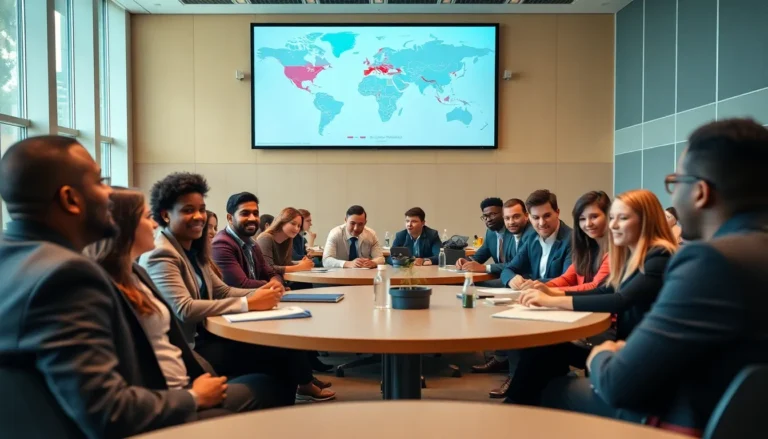Table of Contents
ToggleIn a world where global events can change with the swipe of a finger, studying global affairs is like having a backstage pass to the planet’s biggest show. Imagine diving into the intricate web of politics, economics, and culture while sipping coffee and debating international crises. It’s not just a major; it’s a passport to understanding why your favorite country’s cuisine is suddenly trending on Instagram.
Overview of Global Affairs Major
Global affairs majors study complex international systems. This field combines political science, economics, and sociology. Students analyze global trends and current events, gaining insights into how different cultures interact. Coursework often includes international relations, human rights, and environmental policy.
Multidisciplinary approaches foster critical thinking skills. Students become adept at understanding the relationships among nations and the impact of global issues on local communities. Learning about globalization’s effects is vital.
Internships add practical experience to academic knowledge. Many global affairs programs encourage students to engage with NGOs, government agencies, or multinational corporations. Networking opportunities can lead to careers in diplomacy, international development, or policy analysis.
Students also develop strong research and communication skills. Effective diplomacy relies on clear writing and speaking abilities. Presentations and group projects hone these skills, preparing graduates for professional environments.
Understanding global economic systems plays a crucial role in this major. Economic stability influences political relationships and cultural exchanges. Students evaluate major economic policies, trade agreements, and development strategies.
Ultimately, a global affairs major prepares individuals to address pressing international challenges. Graduates emerge equipped to contribute to solutions in a rapidly changing world. Exploring diverse perspectives is essential for fostering global cooperation.
Core Curriculum
The core curriculum for a global affairs major equips students with fundamental knowledge and skills. Coursework covers essential subjects that shape their understanding of international dynamics.
Required Courses
Analysis of politics, economics, and society forms the foundation of required courses. Students typically study international relations, where they examine the roles of states and non-state actors. Human rights courses explore legal frameworks and global advocacy efforts. Environmental policy classes highlight the impact of climate issues on international cooperation. These courses promote critical thinking and research skills vital for effective policy analysis.
Elective Courses
Elective courses provide opportunities to delve deeper into specific interests. Options often include regional studies that focus on critical areas, like Middle Eastern politics or Asian economic development. Global health courses analyze international responses to health crises and pandemics. Diplomatic history classes provide context for understanding contemporary issues. Students can choose electives that align with career goals, enhancing their education’s relevance and depth.
Skills Developed
A global affairs major cultivates a range of essential skills necessary for navigating complex international challenges. These competencies enhance a graduate’s ability to engage thoughtfully within diverse contexts.
Critical Thinking
Critical thinking forms the backbone of decision-making in global affairs. Students analyze various scenarios, assessing risks and benefits. They learn to evaluate information from multiple sources, improving their ability to form well-rounded conclusions. Engaging with case studies and real-world examples sharpens their analytical abilities, enabling them to identify patterns and connections in global events. Developing this skill set prepares graduates to address multifaceted issues by considering various perspectives and outcomes, ultimately leading to more informed and effective solutions.
Communication Skills
Communication skills play a vital role in the global affairs curriculum. Students practice articulating complex ideas clearly and persuasively through written reports and presentations. They engage in debates and discussions, enhancing their verbal communication abilities. Exposure to cultural differences enriches their understanding of effective communication strategies across diverse environments. Furthermore, developing negotiation skills becomes crucial for those entering fields like diplomacy or international relations. Mastering these communication techniques fosters collaboration and builds strong networks vital for addressing global issues effectively.
Career Opportunities
A global affairs major opens the door to various career paths where individuals can impact the world. Graduates often pursue roles that require strong analytical and communication skills, essential for addressing complex international issues.
Possible Job Roles
Common job titles include policy analyst, international relations specialist, and program coordinator. Individuals may also work as diplomats, human rights advocates, or development consultants. Some graduates find opportunities as researchers in think tanks or with nonprofit organizations. Positions in multinational corporations as global project managers or compliance officers are also available. These roles allow professionals to engage with cultural, political, and economic challenges across the globe.
Employment Sectors
Employment opportunities exist in multiple sectors including government, nonprofit, and private industries. Many graduates work for international organizations such as the United Nations or World Bank. Others may join advocacy groups focused on human rights or environmental sustainability. Corporate settings also seek individuals with a global affairs background for fostering international relations and compliance processes. Academic institutions frequently employ graduates as educators or researchers, further contributing to the field’s growth and understanding.
Real-World Applications
Global affairs graduates engage in various real-world applications, driving positive change in multiple sectors. Careers often involve diplomacy, where they navigate complex international relationships and promote peaceful resolutions. Policy analysis becomes another vital aspect, as they assess proposed legislation and provide recommendations to governments.
International development offers another pathway. Graduates may work with NGOs to implement programs that alleviate poverty and promote sustainable growth. Human rights advocacy allows them to address injustices and protect vulnerable populations, solidifying their impact on global society.
Employers seek professionals with strong analytical skills, so graduates often excel in research roles. Analyzing data trends helps organizations anticipate shifts in public policy, while understanding cultural contexts enhances project effectiveness.
Communication skills play a critical role in various positions. Graduates articulate complex ideas to diverse audiences, fostering understanding and collaboration. Negotiation techniques become vital in diplomacy and conflict resolution, further amplifying their utility in the workplace.
Networking opportunities through internships with international organizations facilitate these career paths. Graduates build connections, enhancing job prospects in government agencies or multinational corporations. The relevance of regional studies contributes to expertise in specific global issues, allowing professionals to tailor solutions that resonate locally.
This multidisciplinary background equips graduates for diverse roles, with some entering academia as educators or researchers. Many contribute to think tanks, influencing public thought and policy. Ultimately, real-world applications of a global affairs major reflect the dynamic interactions between politics, economics, and culture on an international scale.
A global affairs major opens doors to a world of opportunities and challenges. It equips students with the skills needed to navigate complex international landscapes and engage in meaningful dialogue about pressing global issues. With a curriculum that emphasizes critical thinking and communication, graduates are well-prepared to tackle the intricacies of diplomacy and policy analysis.
The diverse career paths available to global affairs graduates showcase the impact they can make in various sectors. Whether working with NGOs or international organizations, they play vital roles in driving positive change. This major not only fosters a deep understanding of global dynamics but also empowers individuals to contribute to a more interconnected and cooperative world.





